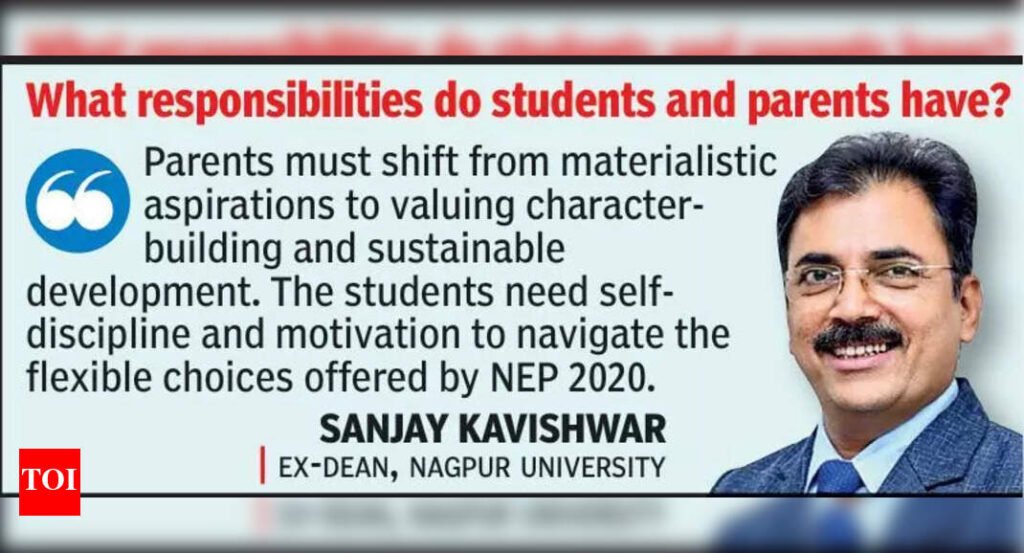Nagpur: The National Education Policy (NEP) 2020 is a transformative framework aimed at addressing critical challenges in India’s education system such as lack of employability, disengaged students, and an overly career-driven approach. In an exclusive interview to TOI, Dr Sanjay Kavishwar, who recently completed his tenure as dean of commerce and management, Nagpur University, and was also director, Board of Examinations and Evaluation, talked about how institutions must now whole-heartedly embrace the changes by shifting the focus from result-oriented to outcome-oriented education. Q. What are the core objectives of NEP 2020? A. NEP 2020 aims to create a sustainable, learner-centric education system that prioritises holistic development, multidisciplinary learning, and employability. It shifts from rote learning and career-driven goals to fostering character, critical thinking, and competence, ensuring students are equipped to contribute meaningfully to society.Q. How does NEP 2020 promote a learner-centric approach?A. The policy introduces a flexible curriculum where students choose courses from diverse verticals like major/minor, value education, vocational skills, and Indian knowledge systems based on their interests and career goals. It emphasises experiential learning, problem-solving pedagogies, and transparent, objective assessments tailored to individual learning styles.Q. What is the significance of holistic development in NEP 2020?A. Holistic development is central to NEP 2020, aiming to nurture learners with character, courage, and competence. Courses on value education, universal human values, yoga, sports, and community engagement projects are integrated to develop responsible citizens who can address societal challenges while balancing academic and personal growth.Q. How does the Academic Bank of Credits (ABC) enhance flexibility?A. The ABC is a digital platform where students’ earned credits are stored, allowing them to take courses from various universities or recognised online platforms. Credits can be redeemed for degrees, and students can exit programmes with certificates or diplomas and rejoin later, offering unprecedented flexibility.Q. What is Outcome-Based Education (OBE) in NEP 2020? A. OBE focuses on defining what a student should achieve after completing a course. Curricula are designed with clear outcomes, specifying content, pedagogy, and evaluation methods to ensure measurable attainment. This approach enhances competence and accountability but requires significant effort from educators and students. Q. How does NEP 2020 address employability through skill development? A. Recognising that theoretical knowledge alone isn’t enough, NEP 2020 mandates skill-based courses in all graduate programmes (BA, BSc, BCom). It promotes vocational training and entrepreneurial skills, though institutions may need to reskill faculty and upgrade infrastructure to meet these demands effectively.Q. What role does the multidisciplinary approach play?A. NEP 2020 breaks disciplinary silos by allowing students to study subjects across streams (Science, Commerce, Humanities). This broadens perspectives, enhances interdisciplinary understanding, and improves employability by producing well-rounded graduates capable of tackling complex, interconnected challenges.Q. What are the expectations from teachers in implementing NEP 2020?A. Teachers are pivotal as mentors, counsellors, and facilitators. They must embrace innovative pedagogies, understand the value of multidisciplinary and value-based education, and adopt transparent assessment practices. Their role extends beyond teaching to nation-building through student guidance and engagement.Q. What responsibilities do students and parents have?A. Parents must shift from materialistic aspirations to valuing character-building and sustainable development. Students need self-discipline and motivation to navigate the flexible choices offered by NEP 2020. Both must work with mentors to ensure informed decisions and effective learning outcomes.Q. How should Higher Education Institutions (HEIs) adapt to NEP 2020?A. HEIs must adopt dynamic frameworks, moving away from rigid processes to customise education for individual learners. They are expected to promote the policy’s spirit, ensuring all stakeholders understand its benefits and actively contribute to its successful implementation. NEP 2020 is a bold step toward transforming India’s education landscape, promising a learner-centric, multidisciplinary, and skill-focused system. Its success hinges on the collective commitment of teachers, students, parents, and HEIs to embrace and implement these changes with dedication and innovation.


